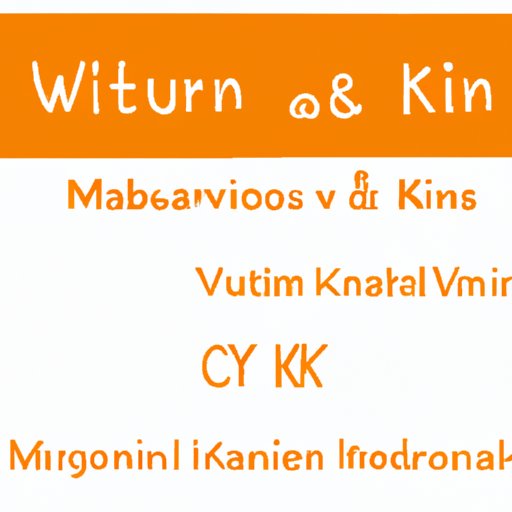
Understanding the Importance of Vitamin K for Newborns
Welcoming a new life into the world is a joyous occasion, filled with love, excitement, and a myriad of challenges. As parents, one of your primary responsibilities is ensuring that your newborn receives all the essential nutrients and vitamins needed for a healthy start in life.
Vitamin K is one such nutrient that is crucial for newborns, and it is often given to them shortly after birth. In this article, we will explore the reasons why Vitamin K is given to newborns, the benefits and risks associated with this practice, and other essential information that every parent should know to keep their baby healthy and strong.
Understanding Vitamin K and Its Benefits
Vitamin K is a fat-soluble nutrient that is essential for proper blood clotting, bone growth, and maintaining a healthy heart and immune system. There are two naturally occurring forms of Vitamin K – K1 and K2, and both are found in different types of foods.
Vitamin K1 is found in green leafy vegetables such as spinach, kale, and broccoli, while K2 is present in dairy products and fermented foods. While Vitamin K deficiency is rare in adults, newborns are particularly vulnerable to this condition due to certain factors beyond their control.
The Risks Associated with Vitamin K Deficiency in Newborns
Childbirth is a traumatic experience, and the newborn’s body undergoes numerous changes to adjust to life outside the womb. As a result, many babies are born with lower levels of Vitamin K in their blood as it does not pass through the placenta effectively. Moreover, breast milk, which is the primary source of nutrition for newborns, is naturally low in Vitamin K.
If left untreated, Vitamin K deficiency in newborns can result in a serious bleeding disorder called Hemorrhagic Disease of the Newborn (HDN). HDN is characterized by bleeding from various parts of the body, including the nose, mouth, and rectum, and can lead to severe brain damage and even death in some cases.
Understanding Vitamin K: Why It’s Given to Newborns and What You Need to Know
The American Academy of Pediatrics (AAP) recommends that all newborns receive a single dose of Vitamin K after birth to prevent HDN. This Vitamin K shot is administered into the muscle of the thigh, and it is typically given within the first few hours of life. The Vitamin K shot is painless, and there are no adverse effects associated with its administration.
While some parents may opt to delay or refuse this shot due to concerns about its safety or necessity, it is important to understand that Vitamin K deficiency is a serious condition that can be easily prevented. In fact, the Centers for Disease Control and Prevention (CDC) reports that there have been no confirmed cases of HDN in newborns who received a Vitamin K shot.
Protecting Your Newborn: The Science Behind Vitamin K Administration
One of the most common questions parents may have about Vitamin K administration is when and how it is given to the baby. The Vitamin K shot is typically given shortly after birth, and it is administered into the muscle of the thigh. The shot is painless and takes only a few seconds to complete.
The timing of Vitamin K administration is crucial and should ideally be given within the first few hours of birth. Delaying the Vitamin K shot increases the risk of HDN, and there is no consensus on the optimal time for administering Vitamin K after the first few hours of birth.
While the Vitamin K shot is generally safe, some babies may experience mild side effects, including swelling, redness, or tenderness at the injection site. In rare cases, some babies may experience an allergic reaction to the shot, but this is incredibly uncommon.

The Controversy Surrounding Vitamin K for Newborns: A Comprehensive Guide
Despite overwhelming evidence supporting the efficacy and safety of Vitamin K administration to newborns, there are still some parents who refuse or delay the shot due to concerns about its safety or necessity. Some internet rumors suggest that the Vitamin K shot may cause cancer or other health issues, but these claims have been debunked by scientific research.
Moreover, any possible mild side effects of the shot are minor and transient and are outweighed by the potential benefits of preventing HDN, a life-threatening condition.
Promoting Infant Health: How Vitamin K Can Help Save Lives
The importance of Vitamin K administration to newborns cannot be overstated. HDN is a preventable condition, and the risks associated with delaying or refusing the Vitamin K shot far outweigh any potential risks associated with its administration.
It is essential that healthcare professionals educate parents about the importance of Vitamin K, its administration, and the potential risks and benefits associated with the shot. Parents must also be made aware of the signs and symptoms of HDN and seek immediate medical attention if they observe any unusual bleeding in their newborn.
Conclusion
Every parent wants the best for their newborn, and ensuring that they receive all the essential nutrients and vitamins, including Vitamin K, is a crucial part of this responsibility. The science behind Vitamin K administration is clear and unequivocal. HDN is a dangerous and preventable condition that can be easily prevented through timely and appropriate administration of Vitamin K.
As healthcare professionals, parents, and caregivers, we must work together to promote and advocate for the health and safety of our newborns. Knowledge is the foundation for informed decision-making, and it is essential that parents have access to accurate, reliable, and evidence-based resources to make the best decisions for their family.
Let us work together to protect our newborns and give them the best start in life possible.
Call to Action
If you are a new parent or an expectant parent, make sure you discuss Vitamin K administration with your healthcare provider and seek accurate, evidence-based information about this essential nutrient. Do not be swayed by rumors, misinformation, or myths. Your baby’s health and wellbeing depend on it.
Final Thoughts
The controversy surrounding Vitamin K administration to newborns is unnecessary and unwarranted. Our focus should be on promoting infant health, safety, and well-being by providing the necessary information and resources to support informed decision-making. Let’s work together to give our newborns the best start in life possible.





